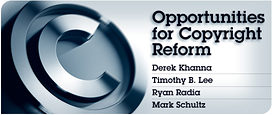Timothy Lee is skeptical that U.S. lawmakers can do much more to combat copyright infringement, given the myriad recent reforms that have tried—and failed—to tackle the problem. If legislative efforts spanning the past several decades haven’t stemmed the tide of infringement, why should we expect Congress to get it right the next time copyright reform comes up?
Lee’s argument is reminiscent of Professor Tom Bell’s 2008 Cato Unbound essay, Towards a Copyriot Act — And Away From It, Again. In it, Bell posits a future in which copyright infringement is rampant and worsening. In response, at the urging of content creators, lawmakers enact the “Copyriot Act” – a law that imposes the death penalty on anyone convicted of copyright infringement. Because individuals tend to overestimate the likelihood of especially dreadful risks, Bell explains, the government would only need to execute a handful of Copyriot Act violators to send a strong message to other would-be infringers.
Also echoing Lee’s argument, the Mercatus Center’s Adam Thierer observed in a 2011 essay that “[c]opyright is dying … bit by bit.” He frets that “[n]o amount of legislating or regulating will likely reverse” the erosion of copyright protection. Thierer hopes that as the Internet evolves, so too will business models and strategies for monetizing content that can thrive without copyright protection—including cross-subsidies, paywalls, ad-supported content, and vertical integration.
Lee, Bell, and Thierer are right to recognize that widespread copyright infringement is here to stay. So long as cheaply accessing unauthorized digital content remains immensely popular, nothing short of draconian penalties will suffice to deter such infringement. Even SOPA—which essentially sought to deputize Internet intermediaries under pain of DNS blocking—probably wouldn’t have made a major dent in infringement, as Larry Downes has argued.
Despite these sobering realities, however, lawmakers shouldn’t throw in the towel and declare copyright a lost cause just yet. Admittedly, it’s easy to overestimate the marginal benefits of legislative efforts to improve copyright enforcement. And some proposed reforms may even do more harm than good, as SOPA illustrated. On the other hand, imperfect enforcement “solutions” may be better than doing nothing at all, especially given how quickly modes of infringement evolve in response to litigation and enforcement.
Consider the January 2012 seizure and shutdown of Megaupload, a notoriously popular file-sharing website based in Hong Kong. Setting aside the illegal and gratuitously militaristic raid of the Megaupload CEO’s New Zealand mansion and the questionable criminal prosecution of the firm’s top brass—among many other serious procedural problems—ridding the Internet of Megaupload was almost certainly the right thing to do.
According to the U.S. government’s indictment of the site, its employees knew full well their users were exchanging infringing content on an epic scale. The site failed to terminate users who repeatedly uploaded content known to be infringing, while one employee even used the site to download an unauthorized copy of an episode of The Sopranos. At its peak, Megaupload reportedly accounted for 4 percent of global Internet traffic—and allegedly netted its owners a whopping 175 million dollars.
Yet had it not been for years of cooperation among law enforcement entities spanning the globe, Megaupload may well have continued to thrive to this day—at the expense of content creators and their fans. U.S. officials and international bodies deserve some credit for pressuring other governments to keep copyright laws up to date, even if the resulting agreements are anything but perfect.
Lee is probably right that more fruitful opportunities exist for Congress to rein in the Copyright Act’s excesses than to improve the enforcement of copyrights. I’d love to see Congress do anything to improve the copyright laws, even if it means leaving some problems to be solved another day. Given the perpetually dysfunctional state of Congress, however, I suspect we have much more time to discuss and debate copyright reform before it sees the light of day.

